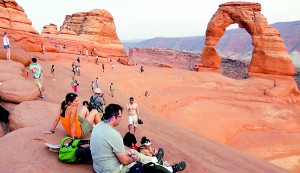Sunday Times 2
Obama against Republican plan on debt ceiling deal
View(s):WASHINGTON, Oct 12 (AFP) -President Barack Obama today came out against a proposal to extend for just weeks the country’s authority to borrow money as crisis talks with Republicans entered the 12th day.
“It wouldn’t be wise, as some suggest, to just kick the debt ceiling can down the road for a couple of months, and flirt with a first-ever intentional default right in the middle of the holiday shopping season,” Obama said in his weekly radio and video address.
Damage “to America’s sterling credit rating wouldn’t just cause global markets to go haywire; it would become more expensive for everyone in America to borrow money.”One Republican idea that was floated to stave off a disastrous US debt default and end a partial government shutdown included a temporary extension to US borrowing authority — without which Washington could begin to default on its obligations for the first time in history after October 17.
The government, shuttered since October 1, will be fully reopened, possibly on an interim basis, and there will be some kind of commitment from both sides to work towards an elusive deal to tackle the deficit, rein in spending and possibly reform social programs and some aspects of the tax code.
The White House said earlier in the week that it would be open to a six-week extension of the debt ceiling after October 17.
But, perhaps sensing that it now has the upper hand in the fight, it now appears to be looking for an extension of borrowing authority from the current $16.7 trillion level for a longer duration.
On Friday, White House spokesman Jay Carney said that a rise in the debt ceiling could not be linked to long-term fiscal talks with Republicans, because it could set up repeated threats of default in the coming months.
The White House and Republicans painstakingly edged toward a deal Friday to stave off a disastrous US debt default and end a partial government shutdown now sure to hit the two-week mark.
President Barack Obama met face-to-face with Republican senators and spoke by phone with Republican House Speaker John Boehner, as subordinates haggled over the terms of an eventual truce to a bitter standoff.
“We are obviously in a better place than we were a few days ago in terms of the constructive approach we have seen,” White House spokesman Jay Carney said.
“But there is not an agreement.”Amid rising optimism for a deal, and multiple tracks of dialogue, the main principles of a compromise emerged in public statements from both sides.
It will include a temporary, or more permanent, extension to US borrowing authority — without which Washington could begin to default on its obligations for the first time in history after October 17.
| Deals struck to reopen Grand Canyon and other iconic U.S. sites
PHOENIX (Reuters) – Three of the most famous U.S. National Parks – the Grand Canyon, Mount Rushmore and the Statue of Liberty – will reopen in the coming days after state governors reached deals despite an ongoing government shutdown.  Tourists gather at the Arches National Park in Moab, Utah. Utah will reopen its national parks and monuments under a deal with the U.S. Department of the Interior (REUTERS) The governors of Arizona, New York and South Dakota said in separate statements on Friday that they had reached agreements with the federal government to reopen their respective parks between Saturday and Monday. The emblematic parks are among 401 National Park Service attractions across the United States that shut their gates to fee-paying visitors on Oct. 1 after the U.S. Congress and the White House failed to reach agreement on raising the nation’s debt limit. |

